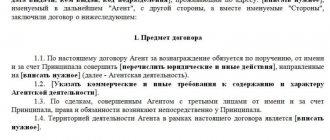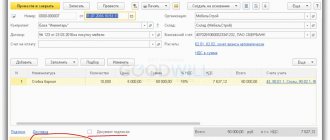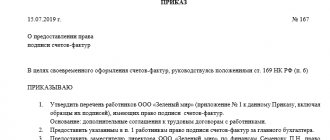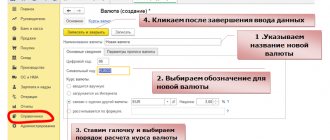Are you an agent or use their services? How are transactions carried out, how are invoices issued and is VAT allocated?
Let's consider the features of interaction between an agent on the simplified tax system and a principal on the general taxation system.
No matter how well you understand the legislation regarding your tax regime, you will not be able to insure yourself against the occurrence of questions and difficulties.
Often, ambiguities arise during the execution of an agency agreement. Let's figure out how agents on the simplified tax system and principals on the OSNO should interact (this is a common situation).
Agent and principal, commission agent and principal: VAT under different taxation regimes for the parties to the transaction
The agent is engaged by the principal in his own interests to perform any actions.
The most common situation is when an agent acts on his own behalf and Ch. 51 of the Civil Code of the Russian Federation (Article 1011 of the Civil Code of the Russian Federation). It follows from this that taxation issues are similar both under the agency scheme and under the work scheme, when the commission agent on the simplified tax system is the principal on the OSNO. Its complexity lies in the fact that an agent (commission agent), who is not a VAT payer, participates in payments for goods whose price includes VAT on his own behalf. You can learn more about the differences between the 2 modes from our article OSNO or simplified tax system - which is more profitable.
We also recommend reading the ready-made solution ConsultantPlus about how the simplified tax system and OSNO differ. If you do not yet have access to the ConsultantPlus system, you can obtain it free of charge for 2 days.
Parties to a transaction using different regimes face 2 situations regarding the accounting and calculation of VAT, depending on which of them applies OSNO:
- On OSNO - principal (committent). If, under the operating method “agent on the simplified tax system - principal on the OSNO”, VAT is allocated in invoices issued by sellers to the agent, then he redirects them to the principal on his own behalf and also acts in the opposite case. The same applies to the commission agent and the committent.
- It is possible to organize work in which OSNO is used only by the commission agent (agent). If the principal on the simplified tax system is a commission agent on OSNO and VAT, as a result, is charged and paid by the commission agent only for the amount of his remuneration (clause 1 of Article 156 of the Tax Code of the Russian Federation), goods purchased for the principal pass through the commission agent (agent) without accrual VAT.
The topic of our article is the taxation of agent and principal.
Note! The COVID-19 pandemic has brought about emergency measures - tax holidays. Read what taxes you can defer and by how long.
How can an agent report on transactions under an agency agreement using the simplified tax system?
If you are acting on behalf of the principal, then for agency transactions you do not need to submit a VAT return or invoice logs to the tax office.
If you are acting on your own behalf, then you need to report to your tax office. The reporting procedure depends on whether you are a VAT tax agent or not:
- if you are a VAT tax agent, then you upload data from the invoice logs to the VAT return (sections 10 and 11 of the declaration) (clause 5 of Article 174 of the Tax Code of the Russian Federation).
The deadline for filing the declaration is no later than the 25th day of the month following the expired quarter.
The declaration can only be submitted electronically via TKS;
- if you are not a VAT tax agent, then instead of a VAT return you need to submit invoice logs (clause 5.2 of Article 174 of the Tax Code of the Russian Federation).
This must be done every quarter in which you sold or bought goods (work, services) for the principal.
The deadline is no later than the 20th day of the month following the expired quarter.
Journals can only be submitted electronically through TKS.
Legal registration of the relationship between agent and principal: agency agreement
To formalize relations with an intermediary, it is necessary to draw up a number of documents, the most important of which is the contract. It must meet the requirements of Ch. 52 of the Civil Code of the Russian Federation. By default, in many cases, the rules on commission and assignment are subject to application to him, depending on whether the agent has the authority to act on his own behalf or on behalf of the principal.
More information about the preparation of such an agreement can be found in the materials on the website following the links: Agency agreement under the Civil Code of the Russian Federation - essential conditions and types, Agency agreement for the provision of intermediary services.
Particular attention should be paid to the following provisions of the agreement:
- Compliance with the essence of agency. Useful information about what features distinguish an agency agreement from related types, and about preventing re-qualification of the agreement is contained in the article at the link: The principal in an agency agreement is...
- Economic feasibility of the transaction (attracting new clients, performing actions that are not practical for the principal to carry out independently).
- Validity of the procedure for determining remuneration under the contract. How best to do this is described in the article on the website at the link: Amount of agent remuneration under an agency agreement. When indicating the amount of remuneration, it should be noted that VAT is not charged on it.
The legal essence of agency corresponds to the legal requirement that the agent must prepare a report.
Basic information ↑
Let’s define what is meant by the expression “agent” and “principal”, what rules should be followed when concluding an agency agreement, and what legal documents should be followed.
Definitions
Principals are persons (owners) who participate in a transaction at their own expense and provide the authority to conclude a certain transaction to agents.
Accordingly, an agent is a person who makes a transaction on behalf of the principals and at their expense. Agents are intermediaries who cannot be a party to the purchase and sale agreement.
Act in accordance with the rules described in the agency agreement. But at the same time, the right to sign the document remains with the principal.
Conclusion of an agreement
An agreement cannot be concluded without reflecting the place where the transaction is carried out, or drawn up with an open date. If such a requirement is violated, there is a risk of falling for the bait of an unscrupulous party who will use one agreement several times.
The contract will be considered concluded if the parties have reached an agreement on all points (Article 432 of the Civil Code). Reflected:
- subject of the contract;
- conditions;
- conditions in respect of which, at the request of one party, the consent of the second party must be obtained.
If such conditions are not met, the contract is considered invalid. You cannot add clauses that contradict imperative norms, otherwise the document is considered void.
Besides:
- The contract price is determined in minimum wage or in an amount that is equivalent during the execution of the contract to a specific amount in the currency of other states.
- When formulating validity periods, you should not be guided by Art. 425 Civil Code.
- The document must be drawn up in several copies (samples are left with agents and principals).
- Each page of the contract must be signed.
- If the contract is paid, then it is mandatory to sign it by the chief accountant.
Normative base
It is worth following the rules of Chap. 52 of the Civil Code.
According to Art. 1005 of the Civil Code, an agent must, for a fee, carry out actions of legal significance or other actions on behalf of the principals on his own behalf, but for the funds of the principals, or on behalf and for the money of the principal.
If the agreement contains provisions granting general powers to the agent to conduct a transaction on behalf of the principals, then the latter cannot refer to the fact that the agent does not have such powers.
The contract may be concluded for specific periods. But such deadlines may not be indicated. The principals pay the intermediaries funds as remuneration in the amount specified in the agreement (Article 1006 of the Civil Code).
If the cost of services is not mentioned, then when determining it, you should refer to paragraph 3 of Art. 424 Civil Code. Payment is made within a week after submitting the report for the previous period, unless otherwise provided.
The existing restrictions for the parties are stated in Art. 1007 of the Civil Code, agent reporting - in Art. 1008 of the Civil Code, and on the preparation of a subagency agreement - in Art. 1009 Civil Code.
The agency agreement terminates:
- if one party refused to fulfill the contract;
- if the agent dies or is declared incompetent, such that he is missing;
- if the individual entrepreneur became bankrupt (Article 1010 of the Civil Code).
The rules on agency and commission agreements apply to agency types of relationships in accordance with Art. 1011 Civil Code.
Acceptance of agent services: report, acceptance certificate
After the contract, the most important agency document is the report (Article 1008 of the Civil Code of the Russian Federation). The agent acts at the expense of the principal, and therefore is obliged to report both actual actions and expenses incurred. The preparation of this document and the possibility of classifying it as a primary accounting document are described in detail in the article at the link: Agent's report under an agency agreement - sample.
The report must disclose the content of the services, indicate natural measurements, prices and costs of services. It is accompanied by primary documents confirming the agent’s expenses. In the absence of specific content of the report, there is a high probability of refusal to recognize the actual nature of the expenses for the agent’s services, and in this case they will not reduce the tax base. As such an example, we can cite the resolution of the AS ZSO dated February 16, 2016 No. F04-28821/15 in case No. A70-2021/2015.
The acceptance certificate for the services provided by the agent, if there is a detailed report, can be drawn up in a simple form.
Issuance by the agent of an invoice for the amount of the agency fee
An agent using the simplified tax system does not charge VAT on the amount of remuneration and does not issue an invoice to the principal for the services provided by him under the agency agreement. However, if he does do this, he becomes obligated to submit a VAT return and pay the calculated tax (clause 5 of Article 173 of the Tax Code of the Russian Federation). At the same time, he does not have the right to deduct expenses incurred, since he is not a VAT payer (clause 5 of the resolution of the Plenum of the Supreme Arbitration Court of the Russian Federation dated May 30, 2014 No. 33).
In turn, the principal has the right to count on a tax deduction, as follows from the resolution of the Constitutional Court of the Russian Federation dated June 3, 2014 No. 17-P. However, to strengthen its position before the tax authority, the principal must:
- the presence of a condition for charging VAT on remuneration in the contract;
- written confirmation from the agent in free form that VAT has been paid to the budget.
In the absence of evidence of coordination of the parties’ actions and a conscious intention to impose the payment of tax on the agent, the right to deduction may be called into question by the court.
Questions that arise ↑
You don't know how to reflect the transactions performed in accounting? We will list the transactions used, and also find out what the general rules for issuing invoices are.
Which of them does not benefit?
Any company that acts as an agent will try to conclude a deal on the most favorable terms for its taxation.
If different systems are used, then the principal should offer the intermediary reward schemes that will force the disclosure of data.
After all, the agent has characteristics that the customer does not know about, and there are also costs for measuring such characteristics. To benefit from this, additional provisions should be included in the contract.
For example, the agent may insist that the principal within the region not enter into agency agreements with other firms, or conduct independent activities that are the subject of the agreement.
In the same way, the principal can insist that agents not enter into agency agreements of a similar type within the territory that was agreed upon in the document.
Issuing an invoice
It is worth relying on the rules for providing an invoice, which are contained in letter No. VG-6-03/404 dated May 21, 2001.
When executing a surety or agency agreement, an intermediary organization acts in relations with third parties on behalf of principals and principals:
| If the products are sold under a guarantee agreement | Invoices must be provided on behalf of principals in the name of buyers |
| When selling by an intermediary company | What represents the company on its own behalf, the products of the principal, the principals, invoices must be prepared by intermediaries in 2 versions on their own behalf. The first sample remains with the buyers, the second must be filed in the accounting journal. There is no need to record data on generated invoices in a ledger used to record sales. The principal provides an invoice addressed to the intermediary organization with a number according to chronological order. It also does not fit into the book for recording purchases. |
| Intermediaries draw up and issue separate invoices to principals, principals, and principals for the amount of remuneration under the relevant agreements | The account must be registered according to the rules with intermediaries in the sales book, and with principals, principals and principals - purchases |
Re-invoicing goods that the agent purchases for the principal
The accrual and payment of VAT on products sold are made by the principal using the OSNO, since the agent on the simplified tax system is not a VAT payer, with some exceptions (import, etc., clause 2 of Article 346.11 of the Tax Code of the Russian Federation). Often, the intermediary is involved in payments for products supplied or purchased by the principal, the price of which includes VAT. The final purchaser of products using OSNO must receive an invoice in order to receive a VAT deduction.
In this case, 2 situations are possible:
- sale of goods for the principal;
- purchase of goods for the principal.
The procedure for registration in both cases is described in the Rules for maintaining a log of received and issued invoices used in VAT calculations, approved by Decree of the Government of the Russian Federation dated December 26, 2011 No. 1137 (hereinafter referred to as the Rules). When purchasing goods for the principal, the agent reissues the invoice, having registered it in the appropriate accounting journal (clause 3.1 of Article 169 of the Tax Code of the Russian Federation), with some design features:
- Indicate your registration number, but the date specified by the seller.
- The details (name, address, tax identification number) of the seller are entered, but the document is signed by the agent on his own behalf.
- At the same time, a certified copy of the original document is submitted. If the agent has transferred part of the goods specified in the original invoice, he draws up his own document for this part (letter of the Ministry of Finance of the Russian Federation dated May 14, 2014 No. 03-07-15/11221).
Other common controversial situations ↑
Let's consider other situations that often occur in practice.
Committent and commission agent on OSNO
Features of interdependence are established by Art. 105.1 NK. A transaction is considered controlled if it is made within the Russian Federation and there is at least one circumstance specified in this regulatory act.
The amount of profit must be more than 1 billion rubles. The amount of profit is understood as the total remuneration received by commission agents when executing the instructions of the principals.
When preparing invoices, you must refer to Art. 168 – 169 of the Tax Code, which stipulates in what situations such an obligation arises.
The rules for displaying them are stated in the Resolution of the authorities dated December 26, 2011 No. 1137
In paragraph 3 of Art. 168 of the Tax Code clearly states that when selling goods/services, transferring rights to property, when receiving funds, amounts for the delivery that is to be made, invoices must be issued.
According to Art. 990 of the Civil Code, according to commission agreements, one party (the commission agent), who is given authority by the second party (the principal), must enter into a transaction for payment on its own behalf using the funds of the principals.
In Art. 996 of the Civil Code states: items that were received by commission agents from the principals belong to the latter.
When making a transfer (in accordance with the agreement) for the sale of products, ownership rights are not transferred to the commission agent, which means that the principal should not provide an invoice.
In addition, if you issue an invoice, you may receive claims from the tax inspector related to the transfer of value added tax, which is included in the invoice.
The obligation to fill out a journal of invoices that have been received and issued arises when a person who does not pay VAT, while conducting business in the interests of other persons, issues or receives an invoice regarding the activities that are carried out.
Commission agents must keep a journal from the beginning of 2021. In accordance with Resolution No. 735, the committent is not required to issue an invoice to commission agents in the event of transfer of goods for sale.
An invoice is issued to intermediaries upon receipt of information about the products sold. It is worth reflecting the date when the invoice was issued to customers.
The numbers are placed in the chronological sequence of the accounts of the principals/committees. The line to indicate the supplier must contain the details of the principals or principals to reflect the buyer - actual buyers, and not agents.
Committent on the simplified tax system, commission agent on the OSNO
When the consignor transfers the goods for sale to commission agents, ownership remains with the former. When selling services, VAT should be calculated as stated in Art. 146 paragraph 1 of the Tax Code.
In accordance with Art. 346.11 clause 2 of the Tax Code, enterprises that use the simplified tax system do not pay VAT, except in cases where the goods are imported within the customs territory of Russia, as well as value added tax in accordance with Art. 174 paragraph 1 of the Tax Code.
Therefore, no value added tax should be calculated by a commission agent who sells goods on his own behalf to the principal on the simplified tax system.
This is interesting: How can you request a reconciliation report with the Social Insurance Fund?
Reverse position
When selling goods under commission agreements, according to which the sale must be carried out on behalf of the commission agent, the commission agent, even one who uses a simplified form, must issue an invoice to the buyers. But you don’t have to pay the tax itself.
With regard to drawing up an invoice when selling goods/work to an individual, the requirement for issuing it is considered fulfilled if the seller issues cash receipts or other documents of a regulated form to the buyer.
This applies to cases when the products of individual entrepreneurs or legal entities operating in the field of retail trade and catering are sold for cash, as well as if services are provided to the public.
Preparation of invoices when an agent sells goods to a principal
The transfer of goods to an intermediary is not a sale, since ownership of the goods does not transfer. An invoice is not generated at this time. When selling the principal's goods, the agent independently indicates the date and invoice number in accordance with his data and himself as the seller. Since what actually happens is that the principal issues his invoice for the goods at a later date, he puts on his document the same date as the agent and the details of the actual buyer.
This requires an exchange of information between the parties:
- the agent provides the principal with copies of his invoices issued to customers;
- The principal issues invoices for the agent based on the information provided.
It is advisable to provide in the agency agreement the procedure for the exchange of information and documents between the parties.
VAT from the agent on the simplified tax system when selling goods, works, services under an agency agreement
If you are acting on behalf of the principal, then you do not need to issue invoices to buyers; the principal does this himself (Letter of the Ministry of Finance of Russia dated October 19, 2015 N 03-07-14/59665).
If you act on your own behalf and sell goods (work, services) to a principal who is a VAT payer, then you must issue invoices to buyers and register them in the accounting journal. There is no need to maintain a sales book for such invoices.
How can an agent on the simplified tax system issue an invoice when selling goods, works, services on his own behalf?
Draw up and register invoices for the shipment of goods (works, services) and upon receipt of an advance from customers in the following order:
1) Write out an invoice addressed to the buyer on your behalf in two copies within five calendar days from the date of shipment of goods (work, services) or from the date of receipt of the advance (clause 3 of Article 168 of the Tax Code of the Russian Federation).
Indicate in it:
- invoice number - the next sequential number for all outgoing invoices (clause “a”, clause 1 of the Rules for filling out an invoice);
- on lines 2, 2a and 2b - your name, address, tax identification number and checkpoint (Letter of the Ministry of Finance of Russia dated October 19, 2015 N 03-07-14/59665).
There are no special features for other invoice indicators, so fill them out in the general order.
The VAT that you allocated in the invoice to the buyer does not need to be paid to the budget. The principal does this.
2) Give the buyer one copy of the invoice.
3) Give the principal a copy of the invoice that you issued to the buyer.
Based on this copy, the principal will issue you an invoice with the same indicators (paragraphs “i” - “l”, paragraph 1 of the Rules for filling out an invoice).
Instead of a copy, you can give him the data from this invoice in another form convenient for you and for him.
There is no deadline for when you must transfer the invoice data to the principal. It is usually defined in the agency agreement. For example, three days from the date the invoice is issued by the agent to the buyer.
The main thing is to transfer this data before the end of the quarter in which you sold goods (work, services) to customers or received an advance payment, so that the principal has time to reflect them in his sales book and include them in the VAT return for these transactions.
How can an agent on the simplified tax system register invoices when selling goods, works, services on his own behalf?
1) Register the invoice issued to the buyer in Part 1 of the invoice journal. Wherein:
- in column 3, indicate the code (clause “c” of clause 7 of the Rules for maintaining an invoice journal, Appendix to the Order of the Federal Tax Service of Russia dated March 14, 2016 N ММВ-7-3/ [email protected] , Letter of the Federal Tax Service of Russia dated September 20, 2016 N SD-4-3/ [email protected] ):
- “01” - if, according to the invoice for the shipment of goods (works, services), the principal issued you a regular, not consolidated invoice;
- “27” - if, according to the invoice for shipment, the principal issued you a consolidated invoice for several customers at once;
- “02” - if you issued an invoice upon receipt of an advance and for this invoice the principal issued you a regular, not consolidated invoice;
- “28” - if, according to the advance invoice, the principal issued you a consolidated invoice for several customers at once;
- in columns 10, 11 - the name of the principal, his TIN and KPP (clauses “k”, “l”, paragraph 7 of the Rules for maintaining an invoice journal);
- in column 12 - the number and date of the invoice that the principal re-issued to you based on a copy of your invoice (clause “l”, clause 7 of the Rules for maintaining an invoice journal);
- in column 14 - the total cost of goods (work, services) including VAT according to the invoice that you issued to the buyer (take from column 9 the invoice on the line “Total payable”) (clause “o”, clause 7 of the Rules of Maintenance invoice journal);
- in column 15 - the amount of VAT on the invoice that you issued to the buyer (take from column 8 the invoice on the line “Total payable”) (clause “p” clause 7 of the Rules for maintaining an invoice journal).
If you issued an invoice to the buyer, which contained goods (work, services) of several principals at once, then in columns 10 - 15 separately indicate the data for each principal. This conclusion can be drawn from paragraphs. “k”, “o”, “p” clause 7 of the Rules for maintaining an invoice journal.
2) Register the invoice that you received from the principal in part 2 of the invoice journal. Wherein:
- in column 3, enter the code (clause “c” of clause 11 of the Rules for maintaining an invoice journal, Appendix to the Order of the Federal Tax Service of Russia dated March 14, 2016 N ММВ-7-3/ [email protected] ):
— “01” — if you are registering an invoice for shipment;
— “02” — if you are registering an invoice for an advance payment;
— “27” — if the principal has issued you a consolidated invoice for several of your invoices for shipment;
- “28” - if the principal has issued you a consolidated invoice for several of your invoices for advance payments from buyers;
- fill out columns 10, 11 only if you are selling goods (work, services) of the principal through subagents (clauses “k”, “l”, paragraph 11 of the Rules for maintaining an invoice journal);
- in column 12, indicate code “2” (clause “l”, clause 11 of the Rules for maintaining an invoice journal).
Why does an agency agreement attract the attention of tax authorities?
Let's compare the tax result in 2 cases (when making a transaction without the participation of an agent and with the participation of an agent using the simplified tax system):
- The buyer purchases the goods at a price of 100 rubles, including VAT 18%, then sells it at a price of 200 rubles. with VAT to a third party. Input VAT: 100 / 1.18 × 0.18 = 15.25. According to paragraph 6 of Art. 52 of the Tax Code of the Russian Federation we discard 25 kopecks. Input VAT - 15 rubles. VAT on output: 200 / 1.18 × 0.18 = 30.50. According to paragraph 6 of Art. 52 of the Tax Code of the Russian Federation is rounded to the nearest ruble. VAT on output - 31 rubles. VAT payable: 31 – 15 = 16 rubles. Income tax: (200 – 100 – 16) × 0.28 = 23.53, rounded - 24 rubles. TOTAL taxes payable: 16 + 24 = 40 rubles.
- The buyer purchases the goods at a price of 100 rubles, including VAT 18%, then sells it at a price of 200 rubles. with VAT, paying the agent a fee of 50 rubles. VAT is the same, but the income tax changes, because expenses include payment for intermediary services (subclause 3, clause 1, article 264 of the Tax Code of the Russian Federation): (200 – 100 – 16 – 50) × 0.28 = 9 .52, rounded - 10 rubles. An agent using the simplified tax system pays 6% on 50 rubles, i.e. 50 × 0.06 = 3 rubles. TOTAL taxes payable: 16 + 10 = 26 rubles, and 3 rubles. at the agent.
Thus, the participation of an intermediary in a transaction leads to significant savings in income tax. The taxpayer’s task is to justify the receipt of tax benefits.
Principal on the simplified tax system: income and expenses
Amounts transferred by the principal to the agent for the execution of the contract are not taken into account in the principal’s expenses until the services are provided by the agent. After all, the simplified tax system takes into account not just payments, but costs after their actual payment (clause 2 of article 346.17 of the Tax Code of the Russian Federation). The amounts of payments returned by the agent are not taken into account in the principal's income. How the amounts sent to the agent for the execution of the contract will be taken into account in the future will depend on the subject of the contract. If the agent purchased goods for the simplified principal with the object “income minus expenses,” then the latter will take them into account in expenses as they are sold (clause 2, clause 2, article 346.17 of the Tax Code of the Russian Federation). If fixed assets were purchased, then expenses will be recognized until the end of the current year (clause 3 of Article 346.16 of the Tax Code of the Russian Federation). The situation is different with the agency fee transferred by the principal to the agent as part of the principal amount for the execution of the agency agreement: it will be recognized as the principal’s expenses in accordance with the terms of its accrual under the agreement - as a rule, on the basis of the agent’s report, where this fee will be indicated (clause 24 Clause 1 of Article 346.16 of the Tax Code of the Russian Federation). If the remuneration is paid to the agent later, separately from the main amount transferred for the execution of the agency agreement, then it will also be included in the expenses of the simplifier






